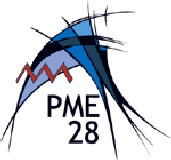


PME28 Bergen, Norway 14–18 July 2004
The 28th International Conference of the International Group for the Psychology of Mathematics Education
Proceedings - by Research Domain
1 - Adult learning
Applebaum, MarkSOIdentification of mathematical mistakes by undergraduate students2 - Advanced mathematical thinking
Alcock, LaraRRUses of example objects in proving3 - Affective factors
Axiak, CettinaRRBeing sensetive to students mathematical needs: what does it take?4 - Algebraic thinking
Ainley, JanetRRConstructing meanings and utilities within algebraic tasks5 - Assessment and evaluation
Bosch, M. AsunciónSOChanging prospective mathematics teachers´ conceptions on assessment: a teacher training strategy6 - Beliefs
Barabash, MaritaSODevelopment of insight of future math teachers as a result of follow-up after development of mathematical concepts7 - Computers, calculators and other technological tools
Ball, LyndaRRA new practice evolving in learning mathematics: differences in students' written records with cas8 - Data handling
Chick, HelenRRWhat is unusual? The case of a media graph9 - Early number sense
Anghileri, JuliaRRDisciplined calculators or flexible problem solvers?10 - Epistemology
Jahr, EinarSOWhat is a mathematical concept?11 - Functions and graphs
Acuña Soto, ClaudiaPPSynoptical and epistemological vision of points in a figural task on the cartesian plane12 - Gender issues
Horne, MarjRREarly gender differences13 - Geometrical and spatial thinking
Callingham, RosemaryRRPrimary students' understanding of tessellation: an initial exploration14 - Imagery and visualization
Elia, IliadaRRThe functions of pictures in problem solving15 - Language and mathematics
Ferrari, Pier LuigiRRMatematical language and advanced mathematics learning16 - Mathematical modeling
English, LynRRMathematical modelling with young children17 - Measurement
Bragg, PhilippaRRA measure of rulers- the importance of units in a measure18 - Mental models
Ferrara, FrancescaRR“Why doesn’t it start from the origin?”: hearing the cognitive voice of signs19 - Metacognition
Mevarech, Zemira R.SOTeachers create mathematical argumentation20 - Methods of proof
Antonini, SamueleRRA statement, the contrapositive and the inverse: intuition and argumentation21 - Probability and combinatorics
Abrahamson, DorPPProblab: multi-agent interactive computer models for grounding probability in perceptual judgments of spatial proportions and in accessible mathematization22 - Problem solving
Back, JenniSOExploring the challenge of online mediation23 - Rational numbers and proportion
Alatorre, SilviaRRProportional reasoning of quasi-illiterate adults24 - Socio-cultural studies
Amit, MiriamRRTime and flow as parameters in international comparisons: a view from an eighth grade algebra lesson25 - Non-elementary numerical reasoning
Singer, Florence MihaelaPPDimensionality in understanding algebraic concepts26 - Teacher classroom practice
Barash, AvivaSOCo-teaching by mathematics and special education pre-service teachers in inclusive seventh grade mathematics classes.